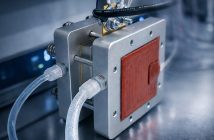
How can the immense power of Artificial Intelligence be used for the healthcare industry while addressing privacy concerns at the same time?
Basically, how can we train algorithms and enable machine learning without sharing sensitive data?
The Musketeer platform may just provide an answer. The privacy preserving technology of Musketeer and its collaborative mission makes the project’s possibilities intriguing.
Enhancing the detection of prostate cancer was the goal of this health care use case. Health data collected by hospitals and clinics using MRI scanners were provided to train the AI algorithms.
All participating health care providers had access to the final model to download from the platform. But no one had direct access to each other’s data – only to the results. Because of security considerations no participant in the federation was ever directly connected to any other participant.
In a traditional way, all the data would have to be centralized in a given location, and the training would be done there. Federated learning prevents that. Hospitals and clinics want their data to remain on their premises, but still be able to extract value from the data to contribute to a model.
Musketeer added a safety net. The AI system prevented potential mistakes. It was not replacing the radiologist but helping him/ her with the image analysis process and relieved the doctors from repetitive tasks. Therefor it increased the patient’s safety and the productivity of the health care provider. The accuracy of AI models for cancer detection was up to 80% and is expected to improve with more data.
Soon smart healthcare will be able to investigate other diseases, like liver cancer, with similar approaches. The use of the Musketeer platform enables the development of AI models for improved support to diagnoses and faster processing in the area of medical imaging – a bis step forward for the health of our society and human kind!
“The Musketeer privacy-preserving Federated Machine Learning solution enables a strong collaboration between different stakeholders in Medical Imaging to develop and improve AI models to support medical professionals in their decision making, improving their workflow and reducing reading time. As providers of advanced medical imaging solutions, we are excited to be able to use and expand a Health instantiation of the MUSKETEER platform to keep collaborating with our partners and customers to deliver innovative AI tools to improve efficiencies and patients’ outcomes.” Joao Correia, Innovation Manager, Biotronics3D said.
“On our side, the direct benefit we can see, and this is the case in general for AI systems, they relieve workers from repetitive tasks, radiologists in our case, especially for studies that are classified as “normal”. They increase safety, they add a safety net if radiologists miss something and detect things that were not detected in their routine since they have a lot of work already. When you use an AI system based on pre-classified data, it gives you the possible findings, stating for instance “this is normal but this area here, you have to see it again”. It is probably fine, but it creates this so-called safety net. It prevents mistakes. It is not replacing the radiologist but helping him through the image analysis process. And additionally, it increases patient safety.” Petros Papachristou, Chief Information Officer, Hygeia Group said.






